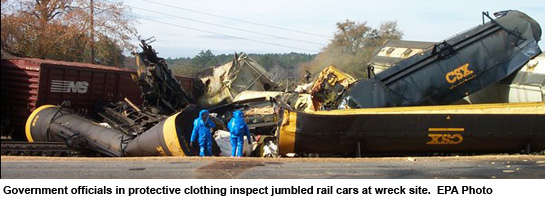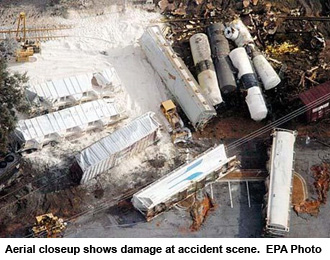


|
|
|
|
|
|
|
|
|
|
|
|
||||||||||||||
|
||||||||||||||
|
|
||||||||||||||
|
||||||||||||||
|
Posted
10/24/2007
The Jan. 6, 2005, spill happed when a train carrying chemicals hit a parked train in the Aiken County community. The impact released poisonous chlorine gas from the moving train. The leak led to nine deaths, hundreds of injuries and displaced thousands of residents. Svendsen is in a unique position to successfully “merge public health practice with public health research.” “Many communities at-risk of environmental disease come to DHEC to have their health questions answered, and DHEC always responds. But sometimes there just is not enough science for anyone to answer those questions completely,” Svendsen said “That is where academic researchers may be able to help. By partnering with communities and DHEC, together they may be able to help build the science base that will ultimately help improve the public’s health.”
He is affiliated with the Arnold School’s Center for Public Health Preparedness, which is responsible for teaching and training the South Carolina public health workforce in disaster preparedness. Svendsen recently was awarded a three-year, $450,000 Mentored Public Health Research Scientist Development Award from the U.S. Centers for Disease Control and Prevention. These awards are considered evidence that the CDC has confidence in a
scientist’s potential and is willing to assist that person in developing
their research skills through a period of protected research and
enhanced mentorship. Svendsen has long been interested in pulmonary disease and a key career objective is to research the environmental determinants of pulmonary diseases within South Carolina communities disproportionately affected by them. Developing the means to identify these areas and then cultivating research partnerships between those communities, public health practitioners, and academic researchers also is a goal of his. To aid his public health research scientist development, Svendsen will be mentored by a seven-member panel of scientists from allied public health disciplines and led by Dr. John Vena, chair of the Arnold School’s Department of Epidemiology and Biostatistics. His other mentors are Drs. Charles Feigley, Robert McKeown, and Wilfried Karmaus from the Arnold School, Dr. James Gibson from DHEC, Dr. Dennis Ownby from the Medical College of Georgia, and Dr. Edward Fitzgerald from SUNY-Albany. Svendsen says the goal of the research component of his Development Award is to gather enough background information to support a much larger grant application for a federally-funded long-term health study of the Graniteville community. “There are still many un-answered questions about the long-term health effects of chlorine gas injury. Many of the victims of the Graniteville chlorine disaster are still concerned about their health, both right now and in the future. Receiving additional funding to study the health of this community is a way to track their future health problems and to potentially help answer some of those yet un-answered questions,” said Svendsen. “This CDC award is a unique opportunity to prepare for the difficult competition necessary to be awarded federal funding for long-term study and tracking of health problems within the Graniteville community. By working together, I hope that we take full advantage of this great opportunity that the CDC has given us,” he said. |
| Columbia, SC 29208 • 803-777-7000 • sphweb@gwm.sc.edu | © University of South Carolina Board of Trustees |

 Arnold
School of Public Health researcher Dr. Erik Svendsen is laying the
groundwork for a potential long-term health study of the 2005
environmental disaster resulting from the Graniteville chlorine spill
and a related program to identify communities where environmental
factors are increasing the risks of environmental disease.
Arnold
School of Public Health researcher Dr. Erik Svendsen is laying the
groundwork for a potential long-term health study of the 2005
environmental disaster resulting from the Graniteville chlorine spill
and a related program to identify communities where environmental
factors are increasing the risks of environmental disease.  Svendsen
is a faculty member in the Arnold School’s Department of Epidemiology
and Biostatistics with a joint appointment as state environmental
epidemiologist for the South Carolina Department of Health and
Environmental Control.
Svendsen
is a faculty member in the Arnold School’s Department of Epidemiology
and Biostatistics with a joint appointment as state environmental
epidemiologist for the South Carolina Department of Health and
Environmental Control.